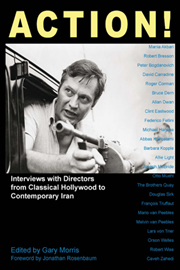Book contents
- Frontmatter
- Contents
- Foreword, by Jonathan Rosenbaum
- Editor's Preface
- Acknowledgements
- Introduction: The Art and Craft of Interviewing
- I Going Hollywood: Masters of Studio Style
- II Tickets to the Dark Side: Festival Favorites
- III Blows Against the Empire: Indie Godfathers
- IV Edgeplay: Avant-Garde Auteurs
- V Women in Revolt: Artist-Activists
- VI The Canon: Brilliance without Borders
- 16 “For a Kind of Pleasure”: Federico Fellini
- 17 Transcendental Style, Poetic Precision: Robert Bresson
- 18 “The Fruitful Tree Bends”: Abbas Kiarostami
- 19 Alter Ego, Autobiography and Auteurism: François Truffant
- Contributor Biographies
16 - “For a Kind of Pleasure”: Federico Fellini
from VI - The Canon: Brilliance without Borders
Published online by Cambridge University Press: 05 March 2012
- Frontmatter
- Contents
- Foreword, by Jonathan Rosenbaum
- Editor's Preface
- Acknowledgements
- Introduction: The Art and Craft of Interviewing
- I Going Hollywood: Masters of Studio Style
- II Tickets to the Dark Side: Festival Favorites
- III Blows Against the Empire: Indie Godfathers
- IV Edgeplay: Avant-Garde Auteurs
- V Women in Revolt: Artist-Activists
- VI The Canon: Brilliance without Borders
- 16 “For a Kind of Pleasure”: Federico Fellini
- 17 Transcendental Style, Poetic Precision: Robert Bresson
- 18 “The Fruitful Tree Bends”: Abbas Kiarostami
- 19 Alter Ego, Autobiography and Auteurism: François Truffant
- Contributor Biographies
Summary
Federico Fellini's (born 1920) fantasy world, which has become more dreamlike over the years, shows us the spectacle of life. Yet, paradoxically, the most surreal of Italian directors invites us to reflect on reality.
What is this reality, which contains everything that happens? Where is it? In us? Outside of us? In our memory, which turns into myth? In the real events that seem like dreams or in dreams that materialize in an immense farce wherein existence is the tragicomic appearance? Like Pirandello before him, Fellini meditates on the ease with which we cross the borders that supposedly mark the difference between reality and appearance.
As in the 1987 film Intervista [The Interview], which he made for Italian television, Fellini identifies a film director with the demiurge of a Great Spectacle. “My films are not for understanding. They are for seeing,” Fellini reminds anyone who persists in undervaluing the aim of his aesthetic orientation.
I talked about this and other things with Fellini in his Rome studio sometime after his last film, La Voce della Luna [The Voice of the Moon] (1990). Courteous, cordial, gifted with a good sense of humor, Fellini, who is mistrustful of journalists–and who loves paradox and ambiguity–kindly tried not to talk about this mistrust. “Really, we should chat about other things,” he told me.
Interview
You don't like to give interviews and it's difficult for a journalist to get one. […]
- Type
- Chapter
- Information
- Action! , pp. 247 - 264Publisher: Anthem PressPrint publication year: 2009



